Why Writers Should Watch “The Fear of 13”
Why Writers Should Watch “The Fear of 13”
By Larry Kahaner
If you agree that all prose – fiction or non-fiction – comes down to compelling storytelling, then the documentary The Fear of 13 is a must-watch. All writers can learn from it.
The movie concerns Nick Yarris, a convicted murderer who has spent 23 years on death row. Except for some flashbacks, the movie focuses on Yarris talking into the camera. Dressed in prison garb, seated in a dark cell, Yarris weaves a can’t-look-away tale of his incarceration, escape from prison (he was on the lam for about a month), then brought back to prison where he was beaten and abused by guards. He tells stories about his childhood, his drug addiction, the lives and loves of gay prisoners, how he met and married a woman who visited him behind bars, and how the new science of DNA would set him free – or would it? Did he really want it? At one point, fed up with prison he petitioned the court to comply with a convicted prisoner’s right to have his execution carried out. He wanted to die even though he professed his innocence.
This push-pull is the brilliance of director Don Sington. We are kept off balance as we rethink what is before us: Is Yarris still in prison or is the background simply a dark empty room? Is Yarris wearing convict clothes or a prison-type shirt? Was Yarris already executed and this is the story of his life? As his unbelievable account unfolds, you never know – until the end – and I’m not going to tell you.
While the director brings his skills, so does the convicted killer. At one point, before being thrown in solitary, a prison guard points Yarris to an empty cell and says “take those books with you.” Yarris, who only went as far as the 8th grade, complies. Is this another cruel bit of torture? Will the guard grab the books back or is it another way to catch Yarris breaking a rule so the guard can beat him? You don’t know until Yarris explains that this tiny act of kindness started him reading books for the first time. He consulted dictionaries to learn all the words he didn’t know. And there were plenty. Indeed, that’s where the title comes from. Yarris is proud to have learned the complicated word ‘triskaidekaphobia,’ the fear of the number 13.
As a prisoner, he had plenty of time to read. He says that he devoured over a thousand books, mostly popular novels, and this is clearly were he gets his storytelling prowess. He obviously learned what all writers know. If you want to tell stories, you must read, and read, and read.
His ability to grab the viewer and pull him in is outmatched by anyone I’ve read or seen in recent years. Again, the room is empty. It’s only Yarris. It’s only words, yet he never loosens his grip on you. You’re forced on the ride, and it’s a dark ride for sure.
His stories are so fantastic – and I mean that in the true sense of the word: “fantasy-like” – that the director was forced to disclaim at the beginning that Yarris’ stories have been verified. Whether he did or not really doesn’t even matter.
I defy anyone – writer or not – to watch Yarris and not appreciate his immense power of storytelling.
(P.S. – The movie came out in 2015. It’s available on Netflix and elsewhere.)











